Mutabal is a creamy, garlicky and slightly smoky dip that is sooo tasty! This quick and easy dip pairs perfectly with some flatbread and a few olives. (Gf, and vegatarian)
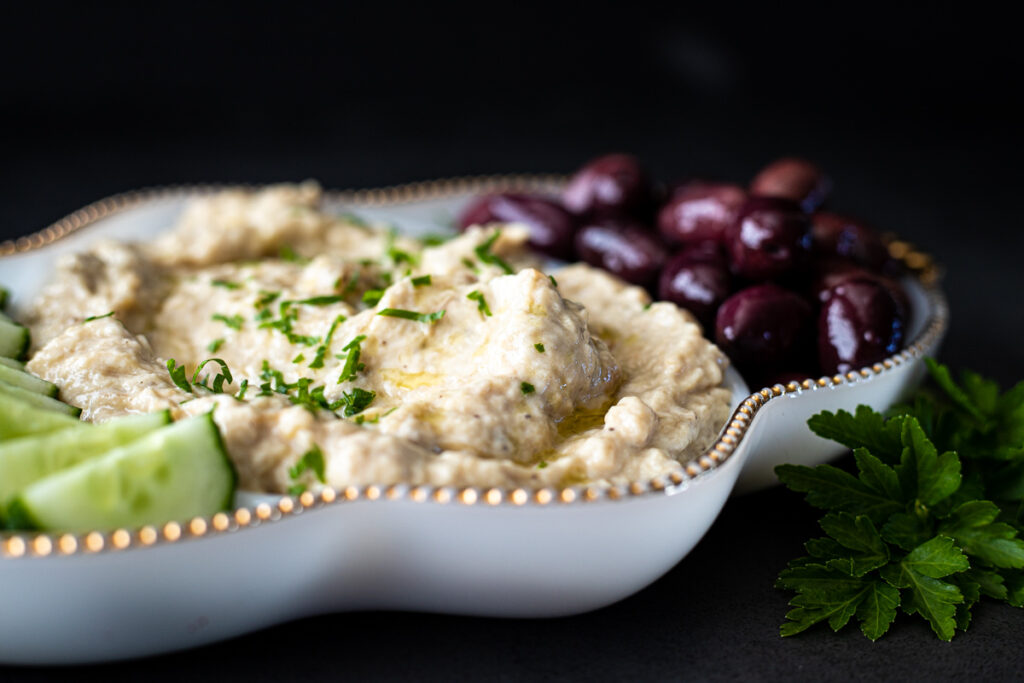
What inspired this recipe
This dip that can be eaten like a salad with cucumbers. I first tried it in a restaurant and knew I had to recreate it. Mutabal is healthy and delicious so I make it often and keep it handy for snacks or serve it with cucumber at dinner. It is great paired with this white bean hummus and some flatbread, sourdough bread or easy no-knead bread.
If you have lots of eggplant, you should also try Eggplant Antipasto and for more cucumber ideas, check out 35+ Easy Cucumber Snack Ideas And Appetizer Recipes).
Jump to:
Middle eastern dips are some of my favorites for their wholesome ingredients. If you like them too, you'll probably like my Easy Healthy Hummus or Baba Ganoush Without Tahini (Roasted Eggplant Dip). The refreshing Mediterranean Cauliflower Salad, Fresh Medjool Date and Carrot Salad and Vegan Lebanese Stuffed Peppers are some of my other favorite dishes from the region.
What is mutabal, moutabal or muttabal?
Mutabal is not baba ganoush, at least not in it's homeland of Syria, Lebanon, Armenia and surrounding areas. It is roasted eggplant, tahini, garlic and lemon seasoned with salt and olive oil. Mutabal seems most common in these countries.
Other regions seem to use the terms baba ganoush and mutabal interchangeably without as much regard for their differences. To many, these differences may seem subtle however to those in the know, these two dips are different. (Read more about eggplant here.)
What's the difference between mutabal and baba ganoush?
Mutabal is the more earthy of the two with it's reliance on heavily charred eggplant, tahini and lots of garlic. Moutabal uses lemon to lighten and compliment the richness. It may include just one or two spices like cumin or paprika but not more. Baba ganoush or baba ganouj is the more fragrant cousin of mutabal with more ingredients. Often it is made as or referred to as a salad with the addition of onion, tomato and cucumber mixed in. Additionally it tends to use more spices and usually includes pomegranate molasses.
Their are arguments as to whether baba ganouj should include tahini or not but mutabal definitely includes tahini. Both can contain yogurt but their are many variations of each without. Baba ganoush varies regionally with some adding walnuts and pomegranate while others add hot pepper, cumin, lemon, onion and tomato and even some other variations.
I've made a little table to help illustrate their differences. (Try my version of Baba Ganoush without tahini here.)
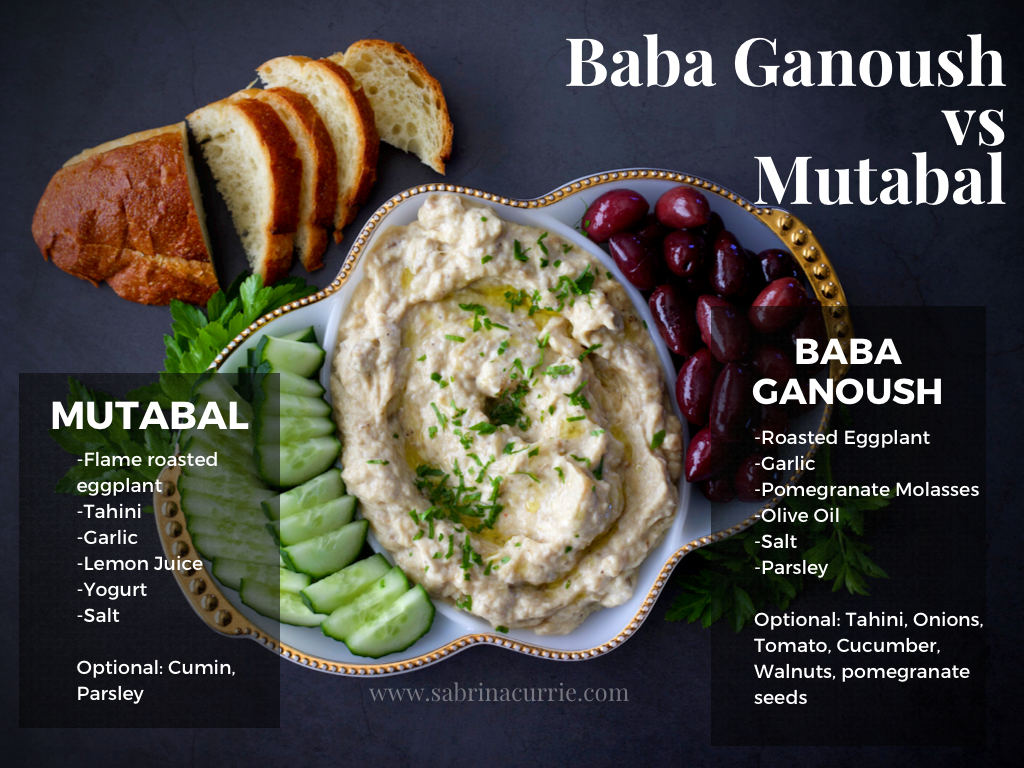
Step By Step Instructions
However you spell it, moutabal/mutabal/muttabal is very simple to make, the time to roast the eggplant is the longest part. Traditional recipes fire roast the eggplant until it is charred on the outside, soft and collapsing on the inside. If you don't have access to a cooking fire, use your grill or broiler.
It is important to roast it close to the heat source until the skin is mostly black and getting deeply wrinkled or crackly looking all over. This will take anywhere from 15-25 minutes depending how hot your fire/grill is. Poking a few holes in your eggplant will prevent any vegetable explosions as well as letting out some of the water to help keep your dip thick.
Once you've roasted your eggplant, let it cool enough to handle.
While it's cooling, grind your garlic and salt together, then add the tahini and mix.
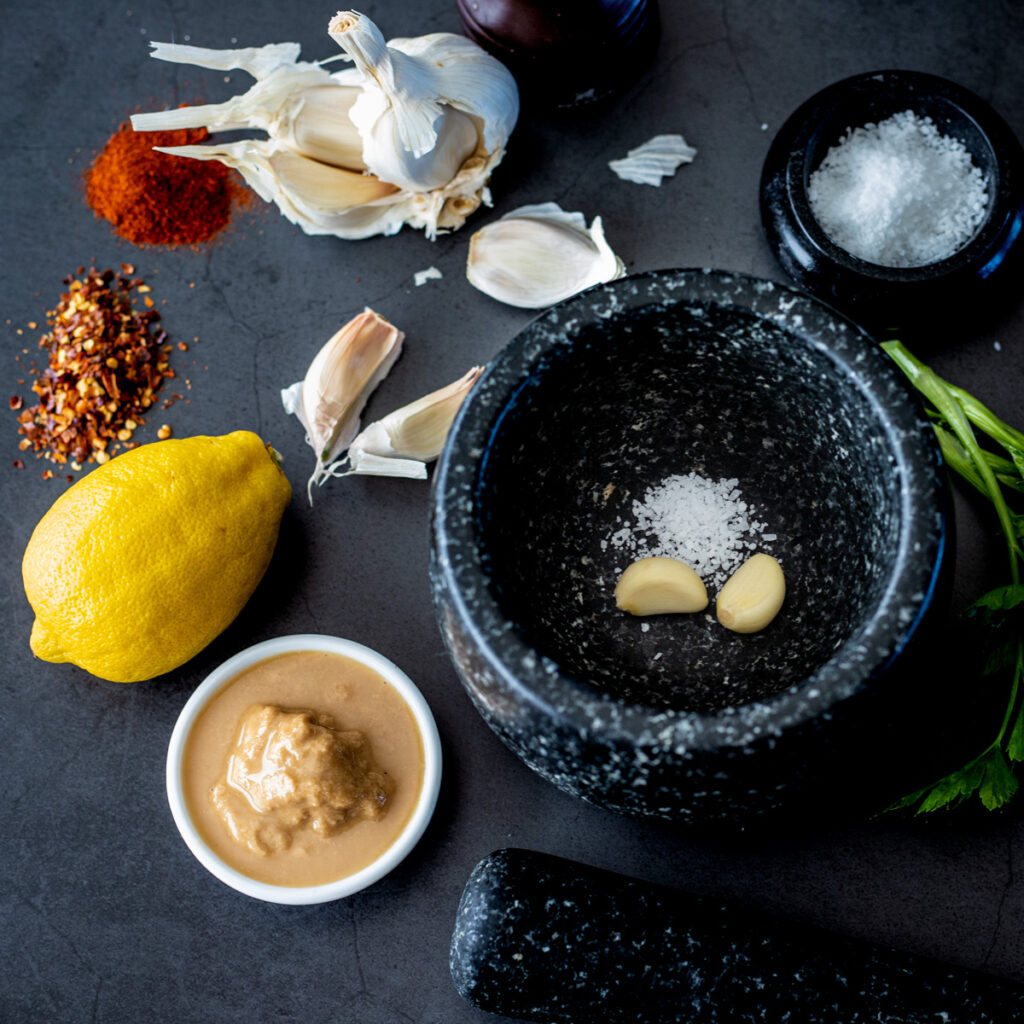
Scoop the eggplant pulp out of it's skin and add to your mixture along with lemon juice. Mix it with a fork, mortar and pestle or your food processor/Vitamix, season with salt and pepper and that's it!
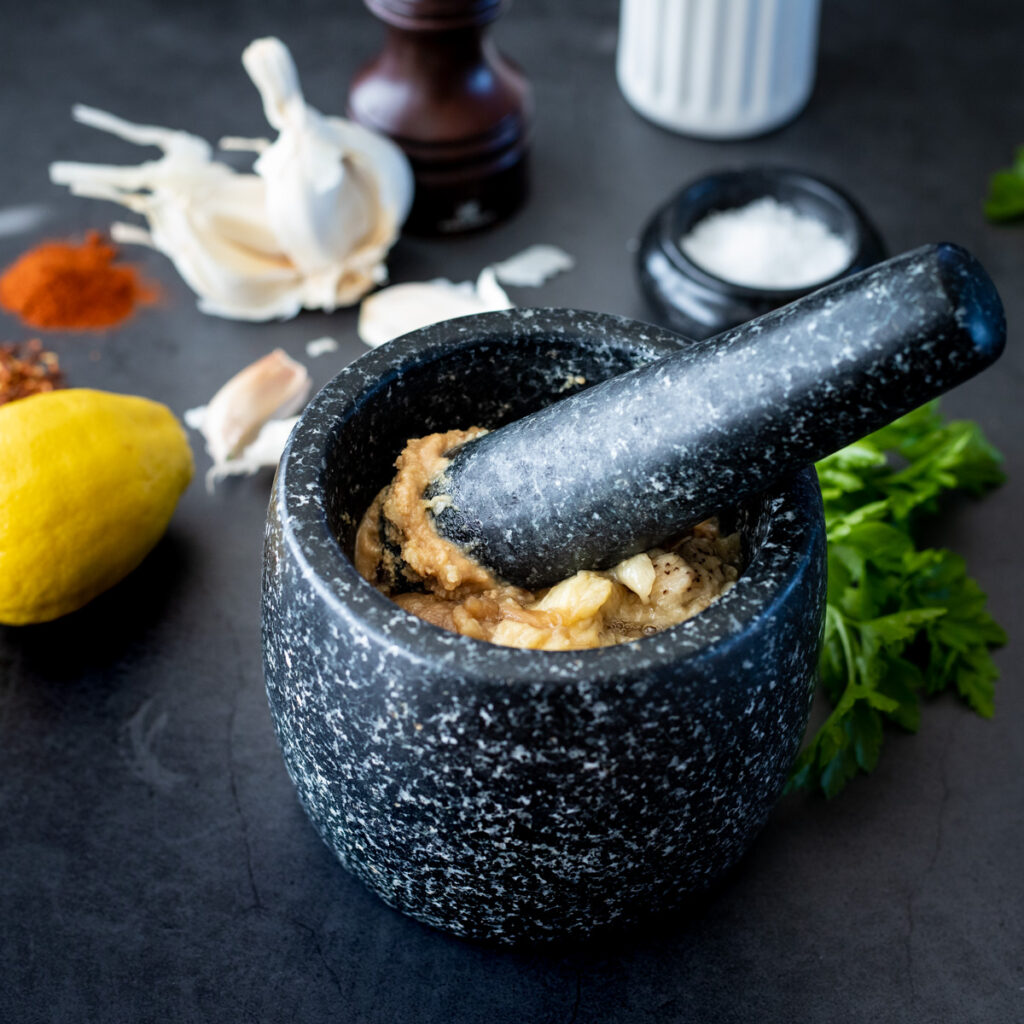
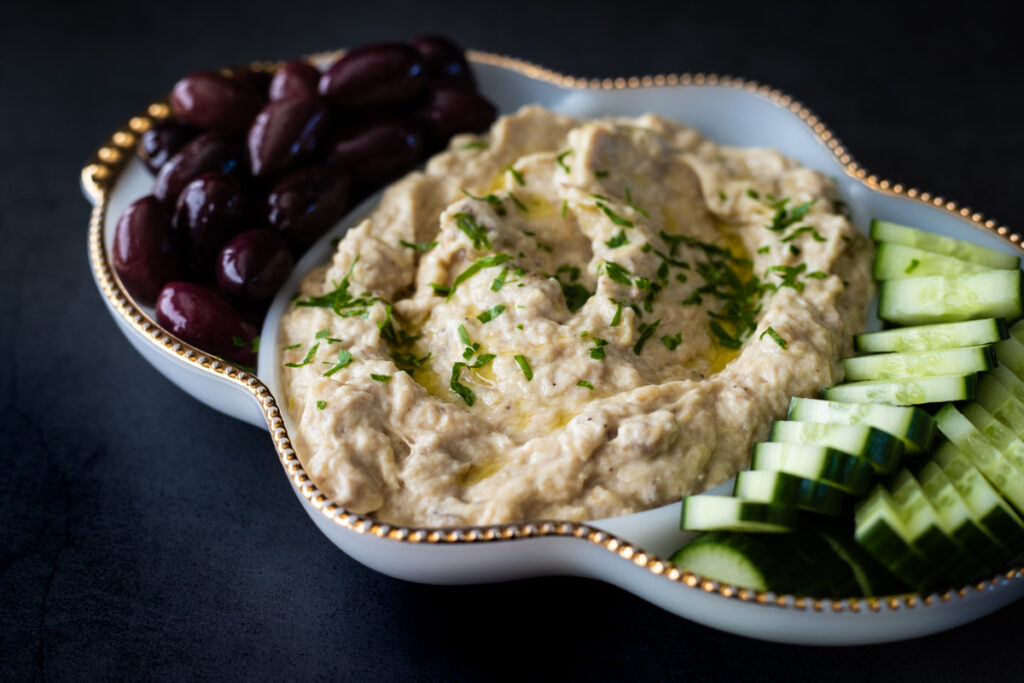
What To Serve With This
Mutabal is often part of a mezze/meze platter-an Arabic (or Mediterranean) dinner platter consisting of lots of small dishes and flavors. Traditional accompaniments include flatbread or pitta and veggies along with hummus, yogurt, olives, feta, nuts and more. It is also a common condiment or side dish with grilled meat or kebab.
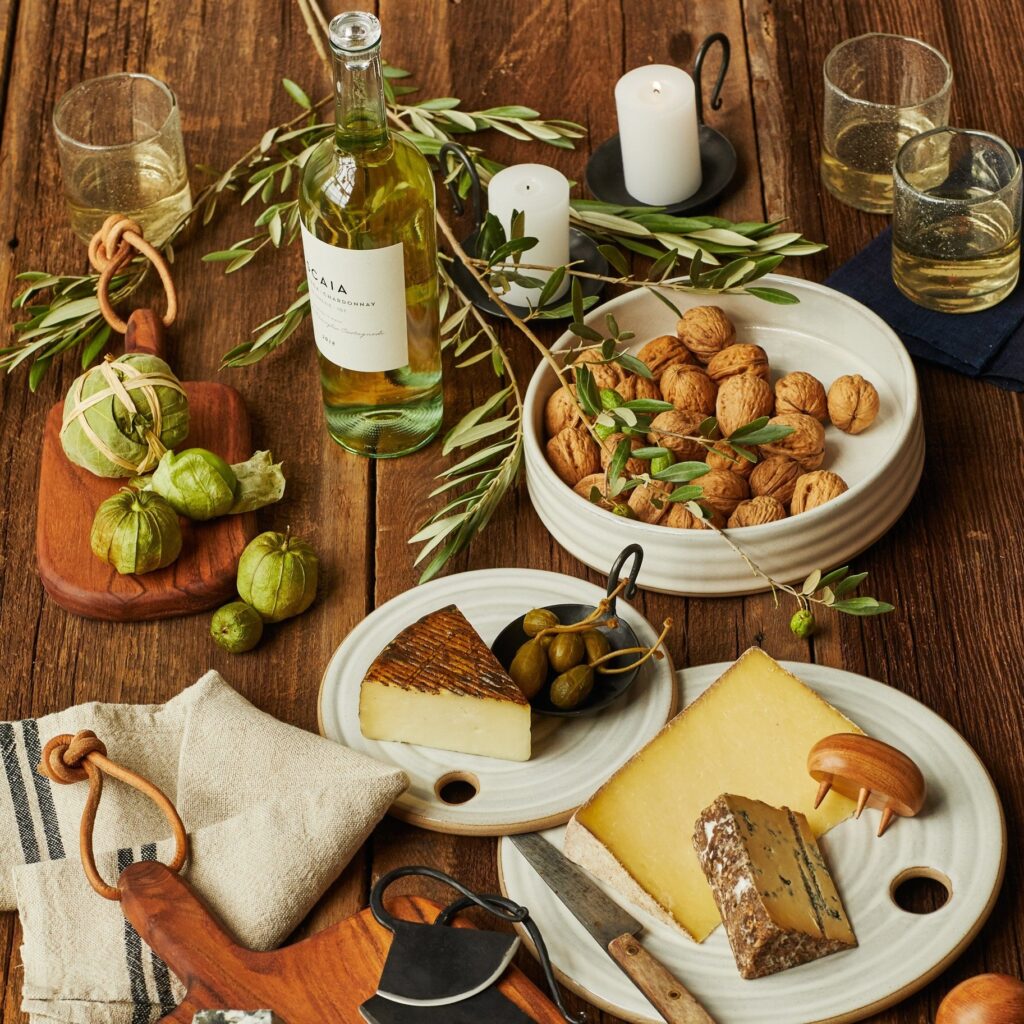
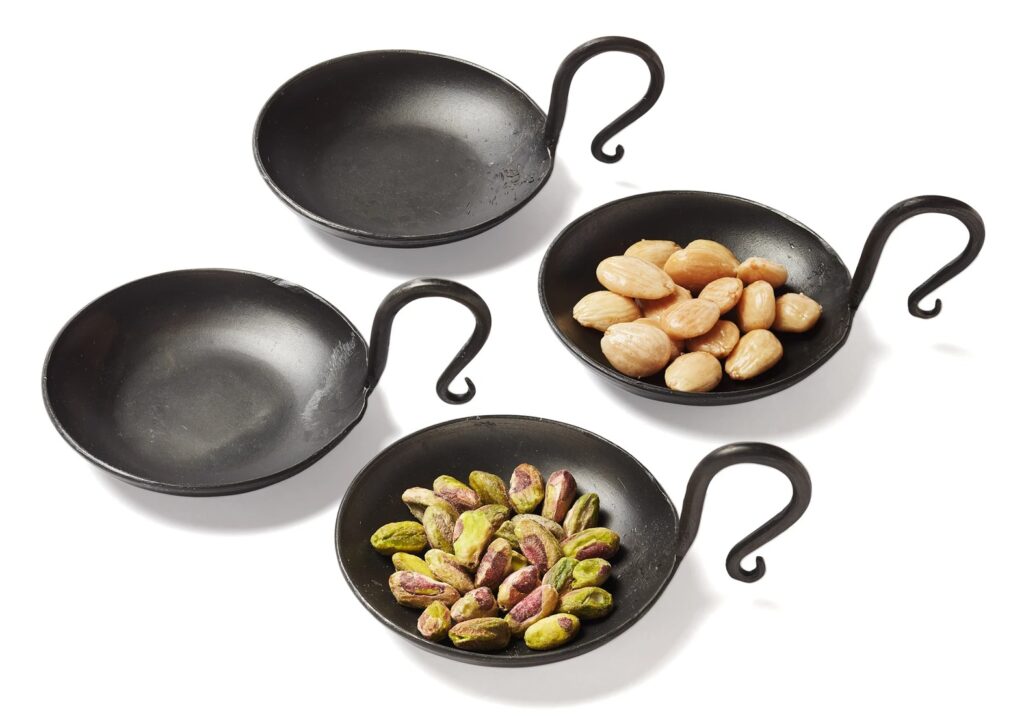
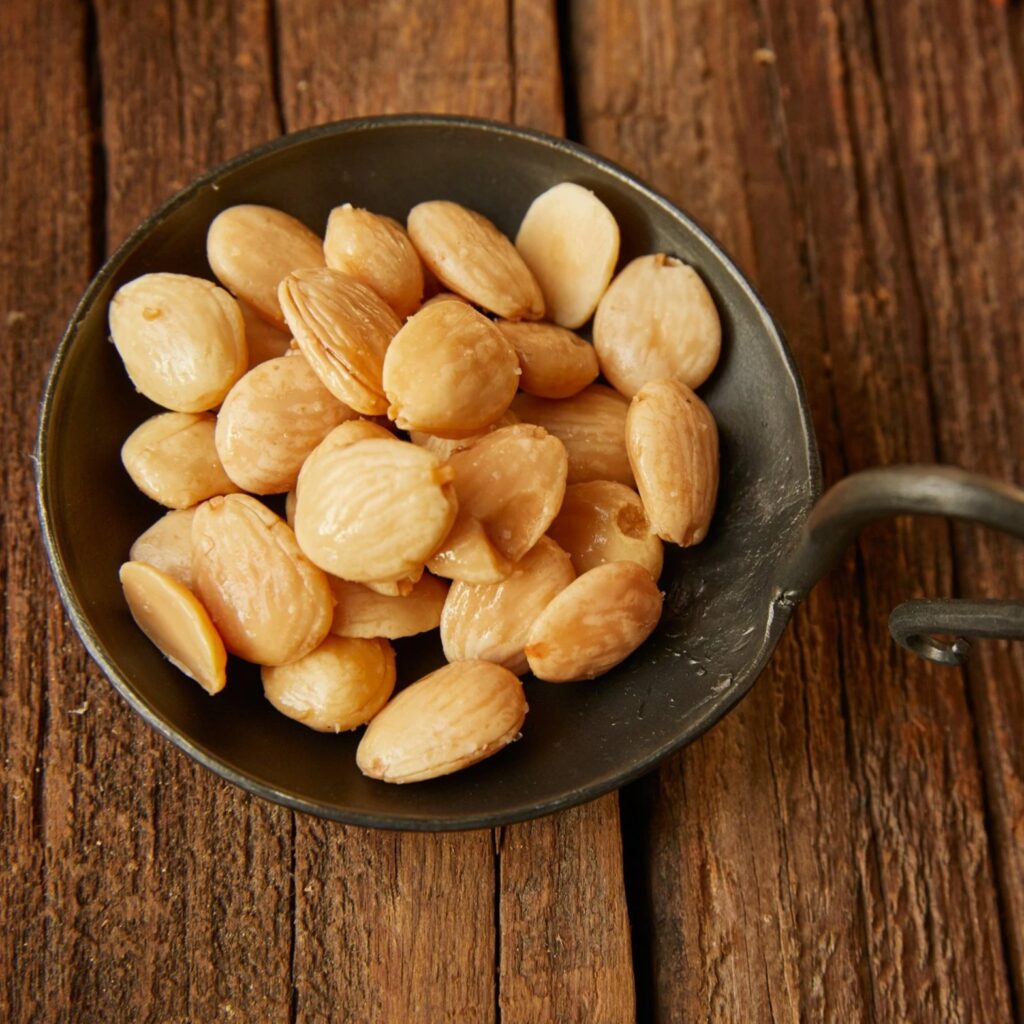
What To Drink With Mutabal
Middle Eastern classic drinks are black tea, fresh mint tea, or cardamom scented coffee. These are enjoyed with pretty much any food. For something a little stronger try Arak, an anise flavored and strong alcoholic beverage popular in the area. Did you know that tea and coffee are often served in tall glass cups in these Eastern countries? I love the elegant look of tea in a glass.
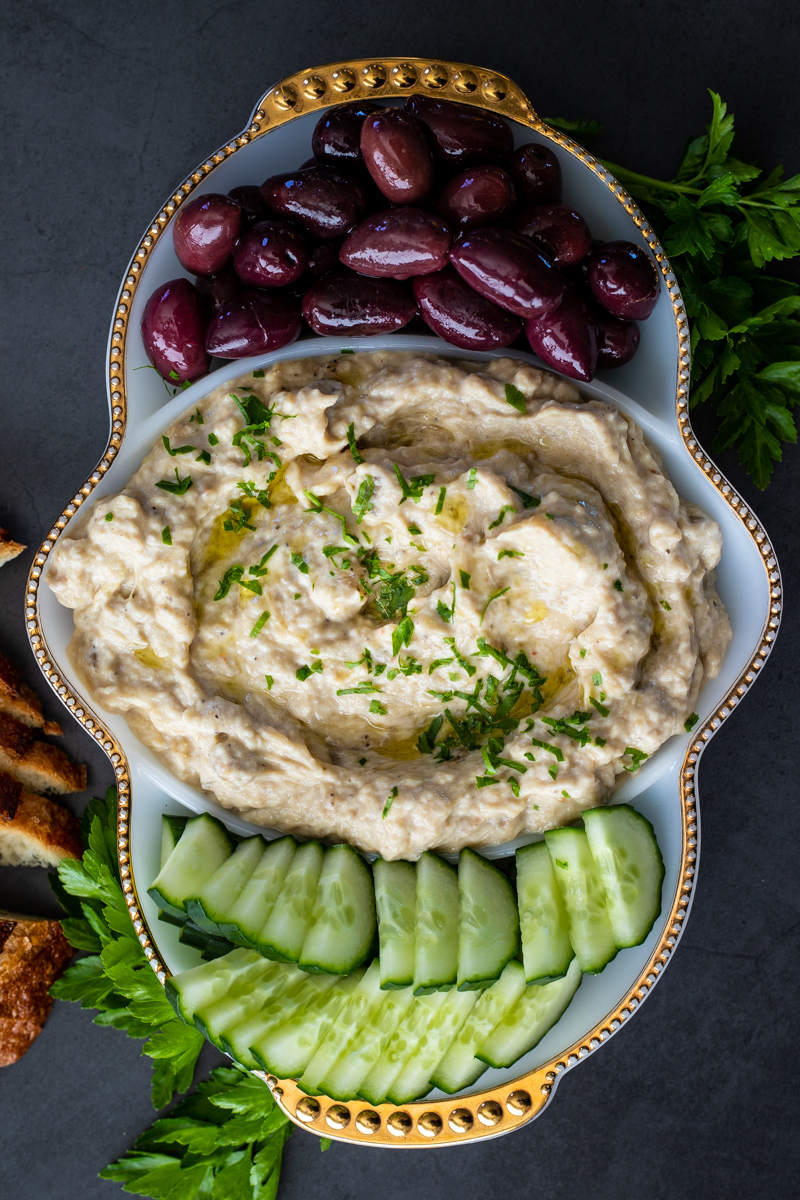
Is Mutabal Vegan?
Mutabal often contains yogurt which is the only non-vegan ingredient. I have made this recipe vegan multiple times by simply omitting the yogurt. It is every bit as delicious and I highly recommend this vegan version of the dip. If you love vegetarian recipes, try this awesome vegan Korean Avocado (Mayak Avocado), luxurious Creamy Hazelnut Soup or one o the recipes from the 65 Best Lazy Vegan Recipes (From 5 to 40 minutes!).
Related Recipes
If you have any questions or comments, you can find me on Instagram, Pinterest and Facebook. I try to answer any recipe related questions quickly as I know you might be in the middle of making it.
Also check out my FREE PRINTABLE meal planner to make menu planning and grocery shopping a breeze and my shopping guide. And if you like this recipe, I would love it if you give it a star rating in the recipe card.
Cheers and happy cooking, Friends! Sabrina
Cheers, Friends
Sabrina
📖 Recipe
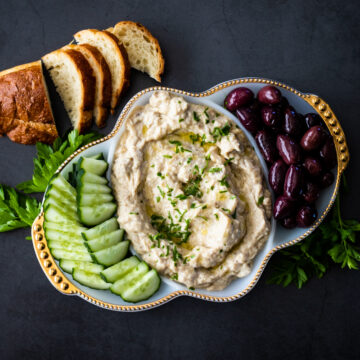
Mutabal-A Traditional Eggplant Dip
Ingredients
- 2 Eggplants (Medium-Large size)
- 2 Garlic cloves
- ⅓ c Tahini (Sesame paste)
- 2 tablespoon Lemon Juice
- Salt and Pepper to taste (I used 1 teaspoon salt, ¼ teaspoon pepper)
- Optional: Olive oil, cumin, paprika, chopped parsley.
Instructions
- Preheat your fire, broiler or grill to highest heat. Once preheated, pierce your eggplants 5 or 6 times each and place whole eggplants on or under the heat source. Turn every 5 minutes or so until the whole outside is charred and the eggplants are soft inside. This will take approximately 20 minutes. Remove and let cool until you can handle it.
- Puree your garlic with the salt with a mortar and pestle, (add ¼ teaspoon cumin at this point if you are using it) in a bowl with a fork or in your food processor. Then add tahini and mix well.
- Remove eggplant pulp from it's skin and add to your tahini mixture. Add lemon juice and start mashing or mixing until you reach the texture you like. This can be chunky and rustic, smooth and silky or anywhere in between. Season with salt (½-1 tsp) and pepper to taste and serve with pita bread or other foods to dip in it.
- Optional garnishes: Drizzle with olive oil or sprinkle with paprika or parsley.
Nutrition
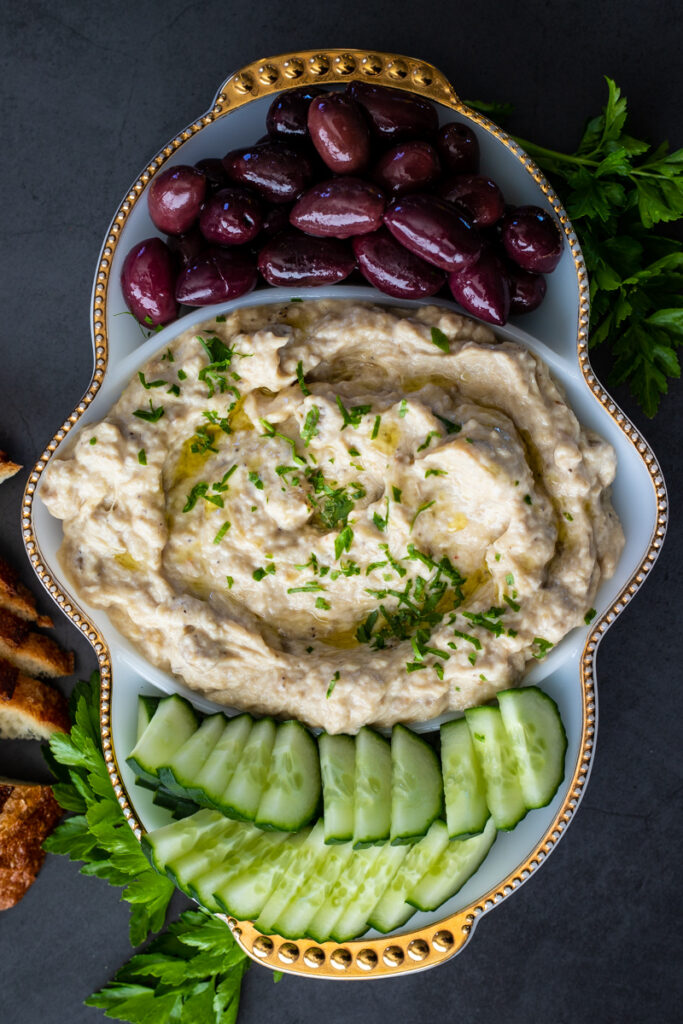


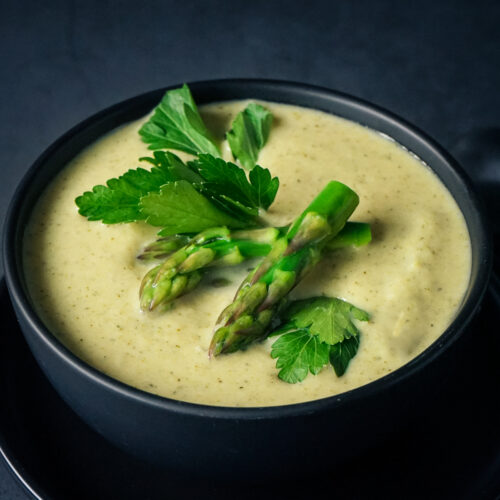
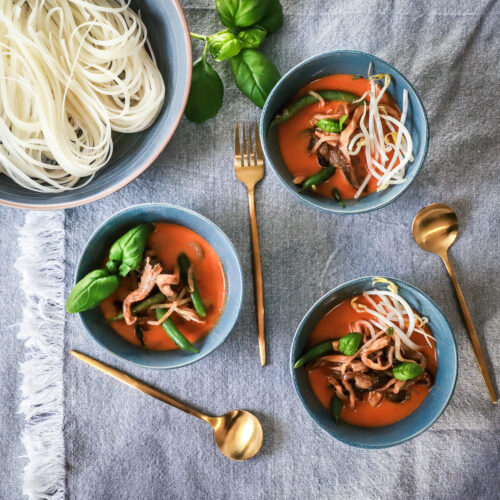
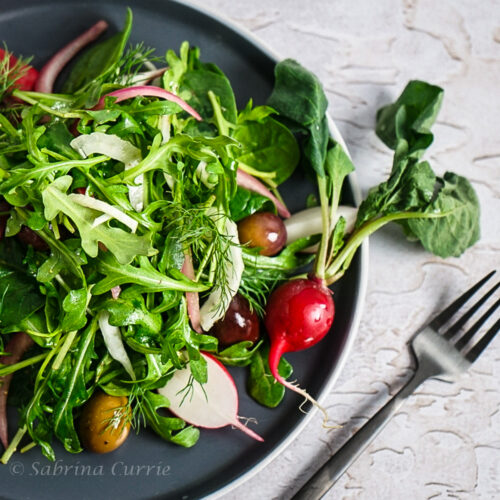
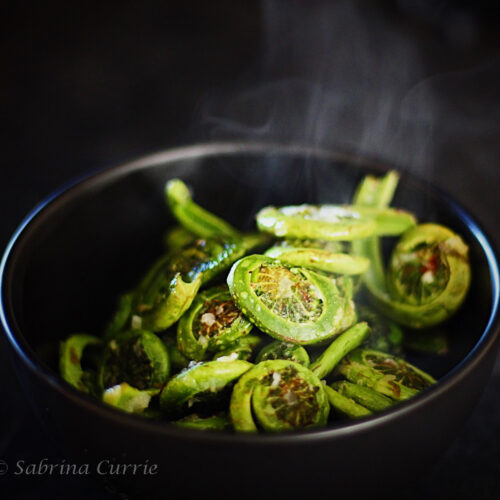
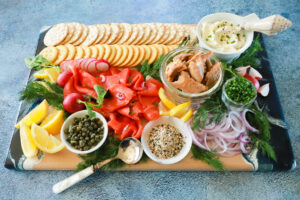



Deb
Mmmm memories of our middle eastern trip; so many good flavors....I lean to the Mutabal as my favorite flavor of these two recipes.
SabCurrie
Food memories are the best! After family memories of course. Did you eat bread or vegetables with the mutabal when you were there?
Vanessa
I live on snack trays in the summer. What a delicious dip to add to my arsenal!
Shareba
Absoultely delicious! I love your photos on this post too 🙂
Sabrina Currie
Thank you so much Shareba 🙂
Marieke
Thank you for sharing a vegan version - this looks delicious!! Also, I appreciate the drink recommendation 🙂
Sabrina Currie
You’re welcome! Cheers Marieke 🙂
amyg
Love this healthy dish. Great for snacking.
Colleen
I do love baba ganoush, so I can't wait to try this delicious looking dip! Beautiful photos, too!
nancy
THanks for the explanation of the difference between Mutabal and baba ganoush, I had no idea! I thought they were the same!
Sharon
MmmmMmmm! I love the cuisine from this part of the world. SO fresh tasting with all of the lemon. Can't wait to give this dish a try.
Audrey
This looks so good- I can’t wait to try it!
Jessica Formicola
I'm always looking for new dips to try, and this eggplant dip looks amazing! I can't wait to make it with dinner this week!
Amyg
I've never tried making an eggplant dip, but this recipe was so easy to follow and my friends liked it very much. I ended us serving it with Tostitos - a great winner!
Sabrina Currie
I’m so glad Amy! Thank you for taking the time to let me know. Tostitos are a tasty dipping choice 🙂
Jerika
Came to know Mutabal because of your recipe. Thanks, can't wait to try this unique dish!:)
Sabrina Currie
I’m so glad, such a popular dish in many parts but not in North America. Thanks for sharing 🙂
Jeannie
Looks so good, A great alternative to hummus as well. Cant wait to try this recipe.
nancy
It's me again! Just want to tell you how much our family loves this dish!
Sabrina Currie
That's so awesome Nancy! Thanks so much for coming back to let me know. Cheers!